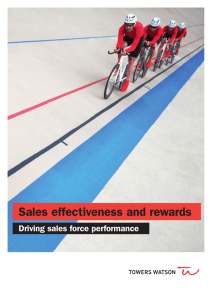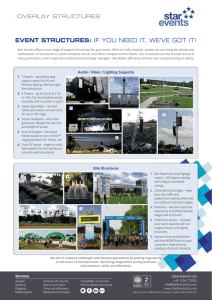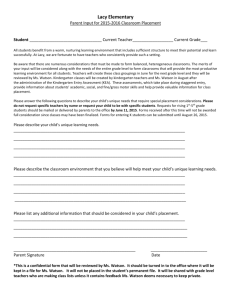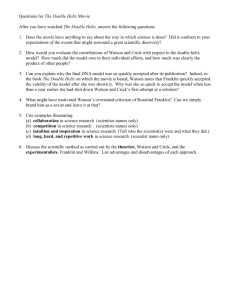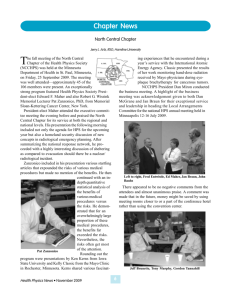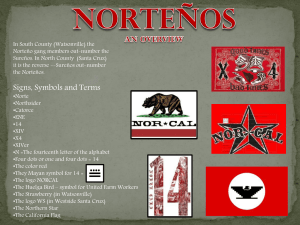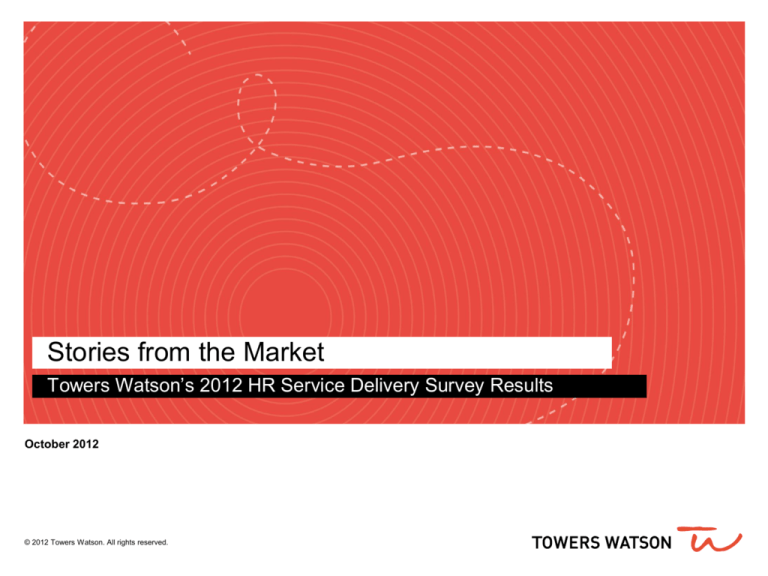
Stories from the Market
Towers Watson’s 2012 HR Service Delivery Survey Results
October 2012
© 2012 Towers Watson. All rights reserved.
Housekeeping Items
All attendee phone lines are on mute.
The Attendee Control Panel contains panes that can be expanded or
collapsed +/- on the left side of each pane. Panes include the Audio Pane
and Questions Pane.
If you are joining the webinar using VoIP, please note that audio quality can
vary based on your audio software/hardware manufacturer as well as your
operating system.
To switch audio formats during the webinar — in the Audio Pane, select
either Use Telephone or Use Mic & Speakers. If switching to the
telephone, be sure to enter the Audio PIN noted in your Control Panel.
The Questions Pane will allow you to submit questions.
If you would like to ask a question — please type it in via the
Questions box.
Please feel free to submit your questions throughout the
presentation.
towerswatson.com
© 2012 Towers Watson. All rights reserved. Proprietary and Confidential. For Towers Watson and Towers Watson client use only.
1
Today’s Presenters
Derek Beebe
HR Technology, Sales and Marketing Leader, Americas
Towers Watson
JT Woodson
Data, Surveys & Technology, Sales, Americas
Towers Watson
towerswatson.com
© 2012 Towers Watson. All rights reserved. Proprietary and Confidential. For Towers Watson and Towers Watson client use only.
2
Introduction to Towers Watson’s research
HR Service Delivery Survey
An annual survey of HR service delivery practices that includes
trends in technology, shared services, employee/manager selfservice and talent management, now in its 15th year
Participants in the survey included HR and IT managers from more
than 600 companies
The results shown in this presentation are based on the global
results
towerswatson.com
© 2012 Towers Watson. All rights reserved. Proprietary and Confidential. For Towers Watson and Towers Watson client use only.
3
Setting the context
Businesses are going through significant change
It has never been more critical that HR be highly effective at
supporting business changes while simultaneously reducing its
cost structure
Despite strenuous efforts, HR needs to make a more fundamental shift
HR in the future must be more agile to keep up with changing
business needs
Continued global expansion will require increased focus on key growth and
emerging markets
The evolving HR technology marketplace will be a key enabler of HR’s agility
towerswatson.com
© 2012 Towers Watson. All rights reserved. Proprietary and Confidential. For Towers Watson and Towers Watson client use only.
4
Main trends in HR service delivery 2012
1
HR is in restructuring mode to be more efficient and cost-effective: Matrix relationships
provide a governance tool while still serving business unit and geographic needs
2
Shared services is viewed as the key to success for HR organizations looking to meet
efficiency and cost-saving objectives
3
Talent systems remain the top HR service delivery issue, and SaaS solutions are viewed
as the most effective
4
HR technology spending remains steady with a mix of enhanced functionality, upgrades
and new implementations and the HRMS market continues to shift toward SaaS
5
Portals are prevalent and can tie it all together, but they still aren’t reaching their potential:
Keeping pace with mobile devices, maintaining content and increasing personalization
continue to challenge organizations
6
Global payroll is challenging, but more global/multinational organizations are driving
toward it
towerswatson.com
© 2012 Towers Watson. All rights reserved. Proprietary and Confidential. For Towers Watson and Towers Watson client use only.
5
Towers Watson’s 2012 HR Service Delivery Survey Results
Key Findings
towerswatson.com
© 2012 Towers Watson. All rights reserved. Proprietary and Confidential. For Towers Watson and Towers Watson client use only.
6
KEY FINDING #1
While a single HR function is the most prevalent HR structure,
geographic and/or business unit matrix relationships are popular for
global/multinational organizations…
Current Structure of HR Function
32%
Single HR function for entire
organization
37%
72%
13%
16%
13%
Separate HR function by business
unit with corporate oversight
Separate HR function by geography
with corporate oversight
23%
15%
4%
Separate HR function by a
combination of geography and
business unit with corporate…
Individual HR functions with no
meaningful corporate oversight
Other
towerswatson.com
28%
26%
HR Business Partners tend to be
aligned with the business unit
and Shared Services align with
geography
8%
3%
5%
1%
1%
1%
2%
Global n = 254
Multinational n = 88
Single country n = 237
© 2012 Towers Watson. All rights reserved. Proprietary and Confidential. For Towers Watson and Towers Watson client use only.
7
Polling Question #1
Do you anticipate changing your HR structure in 2012 or
2013?
Yes
No
towerswatson.com
© 2012 Towers Watson. All rights reserved. Proprietary and Confidential. For Towers Watson and Towers Watson client use only.
8
KEY FINDING #1
… HR is in restructuring mode to be more efficient and
cost-effective…
Do You Anticipate Changing Your
Current HR Structure in 2012 or 2013?
Reasons for Changing Current HR Structure
Realization of further efficiency
potentials
64%
Realization of synergies
54%
Quality improvements
No changes
anticipated
56%
Yes
44%
28% in
2011
n = 612
towerswatson.com
51%
Cost savings
46%
Globalization initiative
28%
Change of business strategy
27%
Business reorganization
26%
Other
8%
© 2012 Towers Watson. All rights reserved. Proprietary and Confidential. For Towers Watson and Towers Watson client use only.
9
KEY FINDING #2
…And shared services is viewed as the key to success
Anticipated Changes to HR Structure in 2012 or 2013
We will be moving to a shared services environment with HR COEs
and HR business partners
39%
We will be bringing additional services into our shared services
environment
31%
We will be outsourcing (some/more) functions
26%
We will be moving to a single HR organization for the entire
organization
10%
We will be decentralizing HR, allowing HR to be run by business unit
or geography
6%
We will be combining our HR shared services with other corporate
functions
6%
We will be bringing (some/more) outsourced functions back in-house
We will be moving away from a shared services environment
The most common responses in the Other
category include changes within existing
framework (14 mentions), new structure yet to be
determined (11 mentions), and increased
centralization or regionalization (7 mentions).
towerswatson.com
Other
4%
0%
17%
Base: those anticipating making a change n = 271.
© 2012 Towers Watson. All rights reserved. Proprietary and Confidential. For Towers Watson and Towers Watson client use only.
10
KEY FINDING #2
…For organizations of all sizes
Does your organization use HR Shared Services (HRSS)/
Contact Center to Deliver HR Services?
46%
40%
Yes, we have an internal onshore service center(s)
17%
Yes, we have an internal offshore service center(s)
Yes, we use an external onshore provider(s)
Yes, we use an external offshore provider(s)
Other
2%
3%
10%
8%
5%
5%
4%
1%
0%
0%
16%
The outsourcing movement has slowed:
In 2010, external models were comprised
of 15% onshore and 8% offshore
10%
4%
3%
0%
3%
29%
No
Large — Greater than 20,000 employees (n = 109)
Small — Between 2,500 and 4,999 employees (n = 83)
towerswatson.com
60%
43%
57%
75%
Medium — Between 5,000 and 20,000 employees (n = 232)
Very Small — Less than 2,500 employees (n = 200)
© 2012 Towers Watson. All rights reserved. Proprietary and Confidential. For Towers Watson and Towers Watson client use only.
11
KEY FINDING #2
But the lines aren’t so bright, even in large organizations
Does Current or Soon-to-be-Implemented Delivery Model
Include the Following Features?
69%
Mixed Ownership
60%
42%
33%
Double-Hatting
47%
47%
12%
Communities of Interest
20%
21%
20%
17%
16%
Shared Resource Pool(s)
18%
Exporting HR Operations
10%
5%
11%
9%
Virtual COEs
5%
Hybrid roles continue to exist — even in
large organizations
Communities of Interest, Shared
Resource Pools and Virtual COEs are
emerging features in service delivery
models for organizations of all sizes
“Traditional” HR services also may be
delivered outside of HR
Large — Greater than 20,000 employees n = 91
Medium — Between 5,000 and 20,000 employees n = 147
Small — Less than 5,000 employees n = 205
towerswatson.com
© 2012 Towers Watson. All rights reserved. Proprietary and Confidential. For Towers Watson and Towers Watson client use only.
12
KEY FINDING #3
Talent systems remain the top HR service delivery issue
Top HR Service Delivery Issues (Top Three by Frequency)
Talent/performance systems
Streamline business processes
24%
5%
Recruiting/Staffing services/Systems
Training
8%
7%
More involvement in strategic business-driven issues
Compensation services/Systems
4%
Upgrade HRMS to a new version/System
Payroll/Time management services/Systems
Systems integration
Accuracy of data
Deploy manager self-service functionality
HR website/Usability
Utilize additional HRMS modules
4%
4%
5%
4%
4%
4%
19%
19%
First mentioned
Second mentioned
Third mentioned
10%
10%
5%
3% 10%
4%
2% 3%
1% 3%
13%
3% 12%
6%
1% 3%
22%
14%
2% 11%
5%
2% 3%
4%
40%
14%
5%
6%
5%
3%
4%
5%
Define/Deploy human capital metrics and dashboards 1% 3%
Introduce standard workforce planning process and tools
6%
7%
22%
7%
9%
11%
4%
7%
6%
4%
Implement a new HRMS
Cost reduction related to HR administration
9%
8%
9%
Improve line managers' people management capabilities
9%
22%
9%
4%
4%
8%
4% 8%
2% 3% 2% 7%
Deploy employee self-service functionality 1%1% 4% 6%
Consolidate multiple HR systems globally 1% 2% 3% 6%
Benefit services/Systems 1% 2%2% 5%
Create a global data warehouse 1%2% 1%4%
Enable mobile access to HR self-service applications 1%1%
Other
2% 2% 2% 6%
n = 606
towerswatson.com
© 2012 Towers Watson. All rights reserved. Proprietary and Confidential. For Towers Watson and Towers Watson client use only.
13
KEY FINDING #3
…And fuel the growth and acceptance of globally
deployed self-service applications
Operations Located In:
Employee Self-Service Functionality In
Place Now
Asia
Pacific
Canada
Europe
Middle
East/Africa
Latin
America
United
States
Change personal data
46%
58%
51%
47%
37%
78%
View pay stub/pay slip
44%
54%
40%
33%
22%
84%
View total compensation and/or benefit
statement
31%
36%
33%
27%
19%
54%
View vacation/sick-time usage and
balances
55%
51%
46%
40%
26%
73%
Update skills, competencies, education,
certifications
36%
41%
39%
41%
34%
53%
Update performance goals and results
52%
55%
54%
52%
48%
64%
View career ladders/job-level definitions
21%
28%
24%
23%
21%
27%
Identify/enroll in learning and development
opportunities
41%
45%
43%
41%
38%
64%
Review career development possibilities
and priorities
22%
27%
27%
23%
25%
31%
Begin “onboarding or joiner administration”
before start date by updating personal data,
taxes, benefits, orientation, etc. via the Web
18%
17%
18%
18%
13%
32%
“Offboard or leaver administration” as
employees exit the organization
23%
16%
18%
19%
12%
19%
towerswatson.com
© 2012 Towers Watson. All rights reserved. Proprietary and Confidential. For Towers Watson and Towers Watson client use only.
14
KEY FINDING #3
SaaS Best-of-Breed applications are viewed as most
effective
It remains to be seen if recent HRMS investments will close the gap in key talent
management functions
Top five largest gaps in effectiveness
Percent fewer of organizations reporting effectiveness using Manual or HRMS
compared to Best-of-Breed (BoB) solutions*
Function
Manual vs. BoB
HRMS vs. BoB
Onboarding/joiner administration
1
(-72%)
2 (-30%)
Competency models
2
(-64%)
Compensation — Sales/incentive
3
(-63%)
4 (-27%)
Performance management (goal-setting,
assessment)
4
(-56%)
Compensation — Global grading/Job leveling
5
(-52%)
5 (-19%)
Compensation — Market analysis/survey
management
1 (-32%)
Compensation — Plan design and analysis
3 (-28%)
* Best-of-Breed solutions used for this comparison are specifically SaaS/vendor hosted solutions.
towerswatson.com
© 2012 Towers Watson. All rights reserved. Proprietary and Confidential. For Towers Watson and Towers Watson client use only.
15
KEY FINDING #4
HR technology spending remains steady…
HR Technology Spending v. Prior Years
55%
54%
52%
53%
43%
25%
22%
22%
15%
11%
6%
7%
4%
6%
Much lower (>20%
reduction)
9%
18%
21%
10% 10% 10%
Lower (<20% reduction)
8%
About the same
Higher (<20% increase)
11%
12%
10%
6%
Much higher (>20%
increase)
2008 Survey n = 382
2009 Survey n = 331
2010 Survey n = 453
2011 Survey n = 437
2012 Survey n = 599
towerswatson.com
© 2012 Towers Watson. All rights reserved. Proprietary and Confidential. For Towers Watson and Towers Watson client use only.
16
Polling Question #2
Do you think your HR technology spending will change in
2013?
Increase significantly (>20%)
Increase moderately (<20%)
Stay about the same
Decrease moderately (<20%)
Decrease significantly (>20%)
towerswatson.com
© 2012 Towers Watson. All rights reserved. Proprietary and Confidential. For Towers Watson and Towers Watson client use only.
17
KEY FINDING #4
…With a mix of enhanced functionality, upgrades and
new implementations
Factors Accounting for Increased HR Technology Spend in 2012
We will be deploying new modules/functionality from existing vendors
38%
We will be upgrading/re-implementing our existing HRMS
36%
We will be expanding our self-service offerings
34%
We will be replacing older systems
33%
We will be implementing new vendors to automate processes for the first time
29%
We will be deploying new HR analytics/workforce planning capabilities
25%
We will be expanding existing functionality into new regions and/or business…
22%
We will be deploying or redeploying an HR portal
21%
We will be deploying or redeploying a data warehouse
12%
We will be implementing new call center support technology
9%
We will be implementing mobile access
7%
We will be moving to an internally deployed cloud-based architecture
We will be bringing services and/or techology formerly outsourced back in-…
We will be moving to an IT outsourcing approach
Other
4%
3%
2%
4%
Base: those expecting increased HR technology spending n = 189.
towerswatson.com
© 2012 Towers Watson. All rights reserved. Proprietary and Confidential. For Towers Watson and Towers Watson client use only.
18
KEY FINDING #4
… and the HRMS market continues to shift toward SaaS –new
SaaS selections (34%) has doubled since 2010 (17%) …
Is Your Organization Currently
Implementing or Planning to Implement a
New Primary HRMS?
New HRMS Chosen
Yes, new HRMS
has been chosen
SAP
24%
Workday
24%
Oracle (Legacy PeopleSoft)
8%
Ultimate Software/Ultipro
18%
Oracle Fusion
10%
No
72%
Yes,
currently
evaluating
options
2%
Lawson
2%
Oracle (Legacy Oracle HRMS)
2%
ADP Globalview/Streamline
1%
SuccessFactors Employee Central
1%
2%
Other
Will be provided by an HRO vendor
towerswatson.com
3%
ADP EmployEase
Custom, In-house solution
n = 618
4%
19%
8%
© 2012 Towers Watson. All rights reserved. Proprietary and Confidential. For Towers Watson and Towers Watson client use only.
19
KEY FINDING #4
… Increasing the opportunity to streamline processes
Approvals/Reviews Required When Managers Initiate HR/Pay Transactions
Manager Approvals
Event
Manager
Notification
Only
HR Generalist/Business Partner Role
Average Number
of Additional
Manager
Approvals
HR Administrator/Service
Center Reviews/Verifies Prior
to Update
1
2
3
1
2
3
4
5
No Review
Receives
Notification
Only
None ↔ Comprehensive
Approves
Exceptions
Only
Approves
All
Creates a new
position
12%
24%
40%
24%
49%
22%
13%
3%
13%
17%
22%
8%
53%
Candidate
selection
20%
32%
34%
14%
53%
23%
12%
2%
10%
18%
20%
14%
48%
Promotion
11%
31%
39%
19%
49%
22%
13%
4%
12%
14%
17%
11%
58%
Annual salary
change
10%
27%
35%
28%
46%
22%
11%
5%
16%
20%
16%
13%
51%
Off-cycle salary
change
9%
29%
41%
21%
43%
22%
17%
5%
13%
15%
11%
11%
63%
Voluntary
termination
41%
37%
16%
6%
56%
21%
10%
4%
9%
19%
36%
6%
39%
Involuntary
termination
20%
30%
34%
16%
40%
24%
14%
7%
15%
6%
16%
7%
71%
(n = 273 – 291)
towerswatson.com
(n = 251 – 265)
(n = 255 – 271)
© 2012 Towers Watson. All rights reserved. Proprietary and Confidential. For Towers Watson and Towers Watson client use only.
20
KEY FINDING #5
Portals are prevalent and can tie it all together…
Does your organization utilize an HR Portal?
Yes, we have an HR
Portal that is available to
both HR and employees
What HR portal technology are you currently using?
Microsoft SharePoint
No, we have no
plans to develop an
HR Portal
31%
SAP Portal
13%
Oracle (Legacy PeopleSoft Portal)
10%
17%
ADP
Oracle (Legacy Oracle Portal)
20%
60%
No, but we
are working
to develop
an HR Portal
3%
towerswatson.com
4%
Infor (Legacy Enwisen)
3%
IBM WebSphere
3%
Custom-developed portal
Yes, we have an HR
Portal that is
available to HR only
n = 599
5%
Other
36%
16%
n = 355
© 2012 Towers Watson. All rights reserved. Proprietary and Confidential. For Towers Watson and Towers Watson client use only.
21
KEY FINDING #5
…But they still aren’t reaching their potential
Does your HR portal provide
a personalized experience?
Which of the following describes challenges with
your existing HR portal?
Site does not support mobile (tablet
or phone)
52%
Information is too generic or lacks
enough personalization
48%
Content is stale
40%
Access is limited to work PC only
No
40%
Yes
60%
38%
Search capabilities are not
effective enough or there are…
36%
Limited analytics or web site usage
35%
Content is difficult or takes too long
to maintain and update
30%
Lack governance for content
management
27%
Multiple HR web sites with
overlapping or competing content
n = 370
towerswatson.com
24%
Sites have inconsistent branding,
"look and feel" or navigation
16%
Too many logins to HR systems
16%
n = 328
© 2012 Towers Watson. All rights reserved. Proprietary and Confidential. For Towers Watson and Towers Watson client use only.
22
Polling Question #3
Do you have an HR portal deployed within your
organization?
Yes – High utilization
Yes – Moderate utilization
No – Plan to deploy within next 6 months
No – No current plans to deploy
towerswatson.com
© 2012 Towers Watson. All rights reserved. Proprietary and Confidential. For Towers Watson and Towers Watson client use only.
23
KEY FINDING #6
Global payroll is challenging, but more global/
multinational organizations are driving toward it
Does Your Organization Have a
Single Payroll Vendor/System?
Payroll Strategy
We make an effort to use a single
system/vendor within a country
No, with no
plans to
consolidate
We allow each location to determine its
payroll strategy
27%
We have selected a global system/vendor
and only use other systems/vendors on
an exception basis
Other
n = 332
towerswatson.com
12%
34%
16%
32%
We make an effort to use a single
system/vendor within a region
We have identified a small number of
systems/vendors and select the
system/vendor based on number of
employees in the location/region
Yes, it is not part of
our core HRMS
32%
15%
22%
4%
6%
Yes, it is
part of our
core
HRMS
No, but we are
working to
consolidate them
n = 338
© 2012 Towers Watson. All rights reserved. Proprietary and Confidential. For Towers Watson and Towers Watson client use only.
24
Why the need to change HR now?
HR functions continue to evolve and change due to economic
challenges and evolving business needs — agility is key
Leading HR functions are taking advantage of this economic cycle to
re-establish themselves as strategic players in the business:
Streamlining transactional work
Increasing the skills of their HR professionals
Working across traditional HR silos
Capitalizing on SaaS technologies
2012 will continue to be challenging, and HR will be pressed to
continue to refine its organizational model and drive more
efficiency
towerswatson.com
© 2012 Towers Watson. All rights reserved. Proprietary and Confidential. For Towers Watson and Towers Watson client use only.
25
If you’d like to submit a question….
Please type your question into the
Questions pane and click the send button
towerswatson.com
© 2012 Towers Watson. All rights reserved. Proprietary and Confidential. For Towers Watson and Towers Watson client use only.
26
Additional Information
http://www.towerswatson.com/hrsdsurvey
towerswatson.com
© 2012 Towers Watson. All rights reserved. Proprietary and Confidential. For Towers Watson and Towers Watson client use only.
27
http://core.ihrim.org
towerswatson.com
© 2012 Towers Watson. All rights reserved. Proprietary and Confidential. For Towers Watson and Towers Watson client use only.
28
December 3-7
December 3 – Global Deployment
December 4 – Global Mindset
December 5 – Global Payroll
T
Sponsored by:
Sponsored by:
December 6 – Global Compliance
December 7 – Global Analytics
towerswatson.com
29
© 2012 Towers Watson. All rights reserved. Proprietary and Confidential. For Towers Watson and Towers Watson client use only.
29
Upcoming Webinars
Wednesday, November 14, 2012
Highlights from the 15h Annual CedarCrestone HR Systems Survey
Presented by: Alexia (Lexy) Martin, Vice President, Research & Analytics,
CedarCrestone
This is an IHRIM Members Only Webinar.
Sponsored by:
towerswatson.com
© 2012 Towers Watson. All rights reserved. Proprietary and Confidential. For Towers Watson and Towers Watson client use only.
30
Credit Hours
This program, #10086, has been approved for 1 recertification credit
hour toward IHRIM’s Human Resource Information Professional
Certification Program. Please visit www.ihrim.org for additional
information.
This program, ORG-PROGRAM-128690 has been approved for 1.0
(Specified – Business Management and Strategy) recertification credit
hour toward PHR, SPHR and GPHR recertification through the Human
Resource Certification Institute (HRCI). Please be sure to note the
program ID number on your recertification application form. For more
information about certification or recertification, please visit the HRCI
homepage at www.hrci.org.
towerswatson.com
© 2012 Towers Watson. All rights reserved. Proprietary and Confidential. For Towers Watson and Towers Watson client use only.
31

